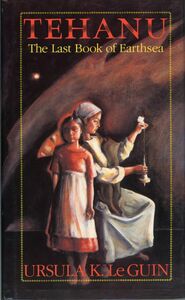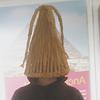Take a photo of a barcode or cover
A remarkable shift from the prior trilogy (related, certainly, to the 18 years between publications) that functions in some ways as a complement to The Farthest Shore in the same way that Tombs of Atuan shifts in relation to A Wizard of Earthsea. The turn towards more adult subject matter is jarring at first, but feels justified by the shift of focus onto Tenar and the more intensely interior nature of the narration.
Much more so than the prior three, Le Guin's "point" here is much more overt, depicting Earthsea as a world with much more rot beneath the surface than even The Farthest Shore is willing to examine. At the same time, it maintains a meditative and curious quality, leveling critiques through Tenar's ongoing uncertainty about her own identity, her potential, her past.
I think this tone can come across as didactic on occasion, but it's bolstered by the complexity of its characters and the sheer strength of Tenar's narrative voice. Tenar gives Le Guin cause to think more deeply about violence, power, misogyny, disability, and community than she had in the prior books in the series. The strength of the novel lies in the breadth and nuance of these philosophical explorations, combined with the underpinning groundedness that has always made Earthsea a compelling setting. It's always still a story about people living their lives.
It's easy to imagine someone feeling betrayed by Tehanu as a shift away from something more fantastical that they liked before. To me, it's an invigorating and thoughtful way to revisit a series in a way that zeroes in on the stories it truly has left to tell.
Much more so than the prior three, Le Guin's "point" here is much more overt, depicting Earthsea as a world with much more rot beneath the surface than even The Farthest Shore is willing to examine. At the same time, it maintains a meditative and curious quality, leveling critiques through Tenar's ongoing uncertainty about her own identity, her potential, her past.
I think this tone can come across as didactic on occasion, but it's bolstered by the complexity of its characters and the sheer strength of Tenar's narrative voice. Tenar gives Le Guin cause to think more deeply about violence, power, misogyny, disability, and community than she had in the prior books in the series. The strength of the novel lies in the breadth and nuance of these philosophical explorations, combined with the underpinning groundedness that has always made Earthsea a compelling setting. It's always still a story about people living their lives.
It's easy to imagine someone feeling betrayed by Tehanu as a shift away from something more fantastical that they liked before. To me, it's an invigorating and thoughtful way to revisit a series in a way that zeroes in on the stories it truly has left to tell.
emotional
reflective
relaxing
slow-paced
Plot or Character Driven:
Character
Strong character development:
Yes
Loveable characters:
Yes
Diverse cast of characters:
Yes
Flaws of characters a main focus:
Yes
Tehanu is not like the other Earthsea books. But this isn't a bad thing. Whereas the other books delve into grand adventures and battles against gods and monsters, Tehanu gives us a look into what life is like once the adventure has ended. Le Guin uses Tehanu as an epilogue to her other stories, giving us some much needed closure, whilst still showing how there are lessons to learn even once we think we've fully grown. I'll be honest, I'm not sure I understood everything in this book, but this book feels like something I'll keep coming back to, learning something new each time I read it. For now though, I found Tehanu to be a relaxing and calming read that better explores the characters of Tenar and Ged as they gain a deeper understanding of themselves, and their relationship.
Minor: Rape
Slow start but so nice to see Ged and Tenar in love - Ursula really hit it out of the park with the womanhood in this one
challenging
dark
emotional
inspiring
reflective
sad
tense
medium-paced
Plot or Character Driven:
Character
Strong character development:
Yes
Loveable characters:
Yes
Diverse cast of characters:
Yes
Flaws of characters a main focus:
Yes
Le Guin’s characterization of Tenar is incredible, honestly she is one of the most well written female characters I’ve read in a while. The relationship between her and Therru was so lovely, and the book as a whole evoked so many feelings about motherhood and women’s trauma and other things that are still so relatable, I can’t believe I’ve only just now read this book!
Graphic: Child abuse, Misogyny, Physical abuse, Injury/Injury detail
dark
emotional
reflective
tense
medium-paced
Plot or Character Driven:
Character
Strong character development:
Yes
Loveable characters:
Yes
Diverse cast of characters:
Yes
Flaws of characters a main focus:
Yes
THIS BOOK!!!!! My favourite Earthsea book for sure. This should be on every woman's required reading list!! I had to buy myself a copy halfway through so I could underline every other line.
Graphic: Child abuse, Misogyny, Fire/Fire injury
Moderate: Death, Rape, Grief, Stalking, Sexual harassment, Injury/Injury detail
Minor: Murder
adventurous
dark
emotional
hopeful
inspiring
reflective
tense
medium-paced
Plot or Character Driven:
Character
Strong character development:
Yes
Loveable characters:
Yes
Diverse cast of characters:
Yes
Flaws of characters a main focus:
No
i think this is my favourite earthsea book. it is written in the perspective of an older Tenar, who at this point has lived a whole life aside from magic. from being Arha and having to follow rigid rules and discipline to being the prentice of a mage, she decides she wants to be a "normal person and do normal people things". as a reader, sometimes it felt like a misstep, there was a yearning for her to realise her inner powers along the way, but she stays an ordinary woman who has had a not so ordinary life. i appreciated what Le Guinn wanted to do with this book, to center voices of those who lived among mages and magic but held no magic within themselves, and what all of that wizardry would look like to them / influence them even without their realising.
i feel like whereas some books focus on character flaws, a lot of this was focused on the strength of people, specifically the strength of girls, women and her communities. it is about chosen family.
Ged shows up in this book depressed and feeling defeated, and has to discover who he is at this point of his life where his magic is gone. i enjoyed seeing this other side to him, as i also enjoyed reading him as a powerful mage.
i was pretty surprised/shocked about the romance between him and Tenar though, as it did get me questioning where did this come from, how old are they in this book, etc.
i am not really a fan of age gaps myself, and i was reading this thinking that Tenar was like 70 or smth in this book because of her expressions of being an old woman, but in actuality she's only 40ish here. there is 15-20 years between them, and though i would have had so much issue with it if this was explored in anyway in Atuan, i also know that at this point, Tenar is an autonomous woman, so there is much less of a power imbalance between them where age is concerned, anyway. not to say that there wouldn't be any, of course, but it is not the same as before her frontal lobe has fully developed.
the ending felt rushed, but i was satisfied either way, it didn't bother me too much.
i feel like whereas some books focus on character flaws, a lot of this was focused on the strength of people, specifically the strength of girls, women and her communities. it is about chosen family.
Ged shows up in this book depressed and feeling defeated, and has to discover who he is at this point of his life where his magic is gone. i enjoyed seeing this other side to him, as i also enjoyed reading him as a powerful mage.
i was pretty surprised/shocked about the romance between him and Tenar though, as it did get me questioning where did this come from, how old are they in this book, etc.
i am not really a fan of age gaps myself, and i was reading this thinking that Tenar was like 70 or smth in this book because of her expressions of being an old woman, but in actuality she's only 40ish here. there is 15-20 years between them, and though i would have had so much issue with it if this was explored in anyway in Atuan, i also know that at this point, Tenar is an autonomous woman, so there is much less of a power imbalance between them where age is concerned, anyway. not to say that there wouldn't be any, of course, but it is not the same as before her frontal lobe has fully developed.
the ending felt rushed, but i was satisfied either way, it didn't bother me too much.
Graphic: Child abuse, Rape, Sexual assault, Violence, Sexual harassment
emotional
reflective
slow-paced
Plot or Character Driven:
Character
Strong character development:
Yes
Loveable characters:
Yes
Diverse cast of characters:
Yes
Flaws of characters a main focus:
No
adventurous
dark
emotional
reflective
slow-paced
Plot or Character Driven:
Character
Strong character development:
Yes
Loveable characters:
Yes
Diverse cast of characters:
Yes
Flaws of characters a main focus:
Yes
dark
reflective
medium-paced
Plot or Character Driven:
Character
Loveable characters:
Yes
Flaws of characters a main focus:
Yes
adventurous
funny
hopeful
inspiring
lighthearted
reflective
medium-paced
Plot or Character Driven:
Character
Strong character development:
Yes
Loveable characters:
Yes
Diverse cast of characters:
Yes
Flaws of characters a main focus:
No




